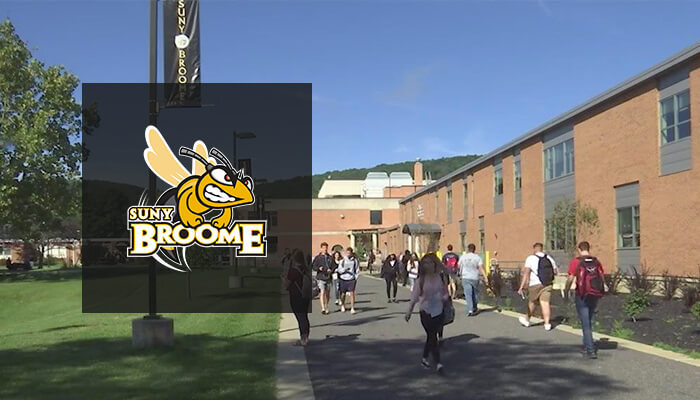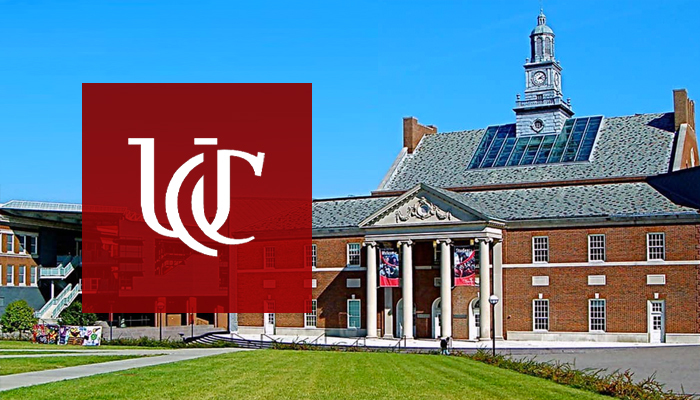
Proactive Student Success Culture Improves Outcomes for All at the University of Cincinnati
Share this Post
For the most part, research institutions have been shielded from the steady enrollment decline impacting higher education. Providing them with a unique opportunity — and an imperative — to provide pathways to social and economic mobility to students and the surrounding community.
Amid this steady decline, the University of Cincinnati continues improving retention and graduation rates, and setting enrollment records.
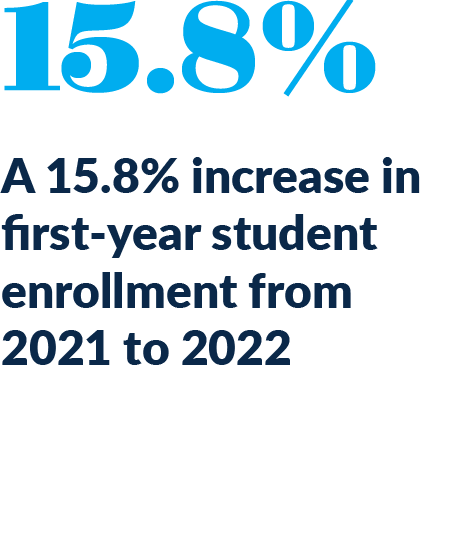
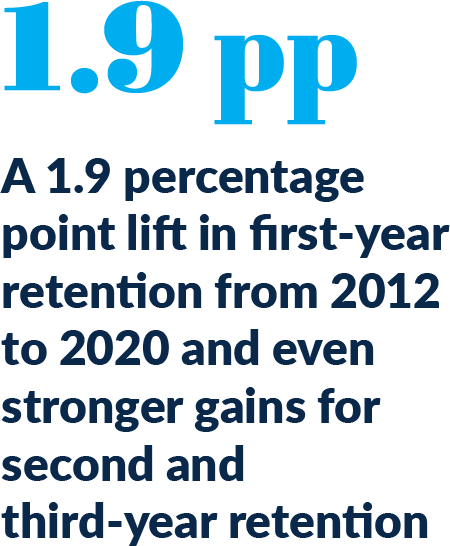
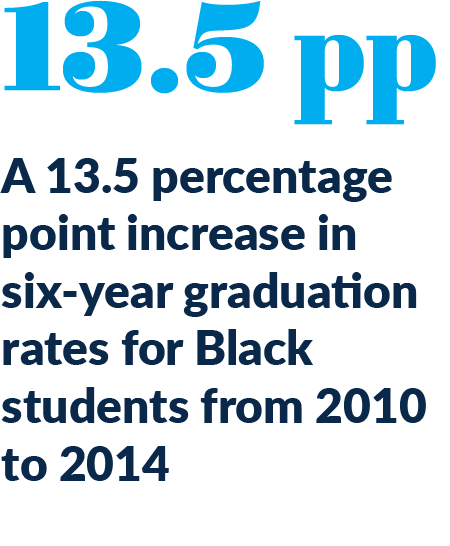
In 2019, its president rolled out the Bearcat Promise, a pledge that all students will leave the university with a degree in one hand and a career plan in the other.
Through a consistent focus on student success that embraces its identity as an urban public research university, UC has achieved remarkable outcomes, including:
- a 15.8% increase in first-year student enrollment from 2021 to 2022
- a 1.9 percentage point lift in first-year retention from 2012 to 2020 and even stronger gains for second and third-year retention
- A 7.7 percentage point increase in overall six-year graduation rates from 2008-2014
3 Key Elements of UC’s Student Success Model
- A student success framework that ensures a graduation plan and enhanced career education for all students,
- A proactive advising culture cultivated within a decentralized advising structure, supported by data analysis and an effective student success platform,
- Increased access through strategic partnerships with Cincinnati Public Schools and two open admissions, low-cost regional colleges that are part of the UC system.
Graduation Plans and Enhanced Career Education for All
Bearcat Promise is UC’s umbrella student success initiative to help students feel supported and part of the UC community. At the same time, they build academic and professional competencies on the path to graduation.
With an ambitious goal to provide each student with a graduation and career development plan and enhanced career learning opportunities, Bearcat Promise is changing the face of academic support and career preparation on campus.
UC’s administrators invested in the Civitas Learning Student Impact Platform to support a holistic advising approach required to meet the goals of Bearcat Promise. Academic advisors and career educators are now better equipped to access students’ graduation and professional development plans from one platform, allowing for more informed and holistic discussions with students.
The University of Cincinnati invented cooperative education in 1906, and many of UC’s degree programs include a one-year cooperative learning experience. Building on this early innovation, UC has embedded career learning outcomes into academic classes to enhance students’ career readiness. A parallel initiative ensures that all UC students can participate in supervised, major-related, compensated work experiences by increasing the number of part-time and on-campus co-op opportunities.
Building a Proactive Advising Culture within a Data-Activated Decentralized Advising Model
Academic advising at UC takes place within the college of the student’s major, resulting in a decentralized advising and student success model. While decentralized models can create challenges for university-wide student success initiatives, UC embraces the existing structure and is advancing a proactive advising culture by leveraging data analytics and an intelligent student success platform to support the campus advising community.
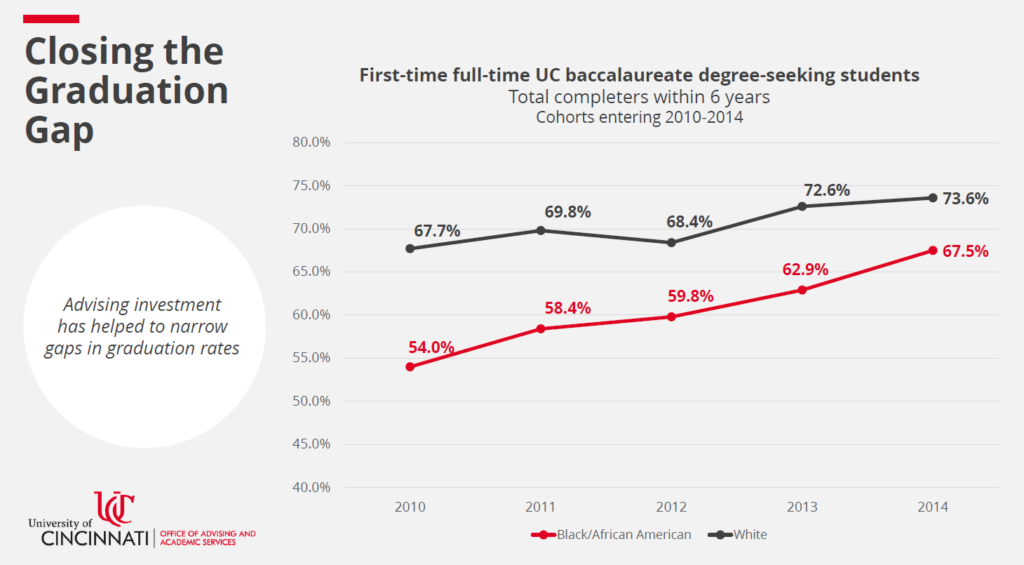
Tara Warden, Assistant Vice Provost for Advising, Academic Services, and Strategic Partnerships at UC, says the university has been working to address advising capacity issues that have arisen, in part, due to the university’s steady enrollment and retention gains. With average advising caseloads of 330 students per advisor, Warden and her staff seek to partner with the UC advising community to leverage the Civitas Learning Student Impact Platform in ways that create workflow efficiencies for advisors and support a more proactive approach to their work.
UC’s academic advisors can better manage their caseloads through dashboards that help make meaning of important student data, dynamic and static student lists for quick access to student records and tracking of student performance, and efficient and effective calendar and note-taking features within the Civitas platform.
Increasing Access Through Strategic Partnerships
The University of Cincinnati embraces the reality that, as an urban university, it is only as strong as its community. Further, the university recognizes a moral imperative to support the education goals of underrepresented minorities in Cincinnati.
This awareness leds UC to commit to the academic futures of Cincinnati Public Schools students and students enrolled in the two open admissions, low-cost regional colleges that are part of the UC system.
Focused on student readiness, access, and success, CPS Strong engages Cincinnati Public Schools students from middle school through high school. The program ensures preparedness for college, removes barriers within the college admission and financial aid application processes, and provides dedicated academic support for CPS students who matriculate to UC.
Through these innovative strategic enrollment initiatives, the University of Cincinnati is creating access on campus while contributing to a stronger, more inclusive Cincinnati.
Embracing Institutional Identity, History, and Campus Culture Yields Greater Student Success
In higher education, finding the right combination of student success initiatives and the means to implement them is challenging for campus leaders, administrators, and student success teams.
The University of Cincinnati provides an excellent example of a university that has strengthened enrollment, retention, graduation, and equitable access by embracing its identity, history, and campus culture. Through enhanced career education and graduation planning, the cultivation of a proactive advising culture within a decentralized student success model, and increased access through strategic partnerships, UC has achieved remarkable progress toward its student success goals.


